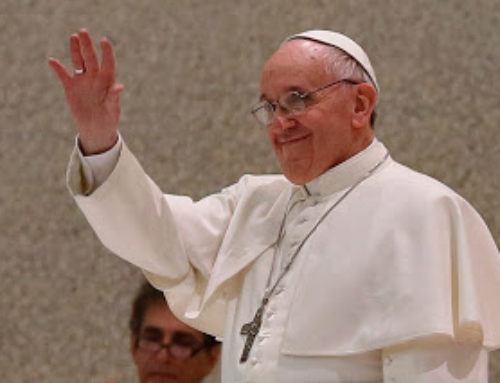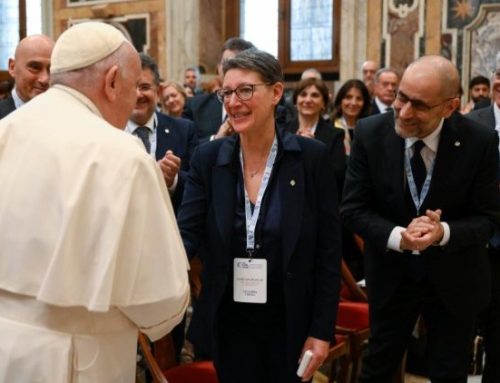28 May 1983
To the participants in the Third World Congress on Emergency Medicine
In the late morning of Saturday, 28 May, John Paul II received in audience in the Clementine Hall approximately five hundred doctors and experts from various nations who took part in the Third World Congress on Emergency Medicine held in Rome. The group, accompanied by Mons. Fiorenzo Angelini, Auxiliary of the Vicar General of Rome, delegated to religious assistance in hospitals and nursing homes, was led by Prof. Corrado Manni, President of the Congress and of the International Society of Emergency Medicine, who addressed a brief greeting to the Pope.
Following this greeting, John Paul II delivered the following discourse.
1. I am happy about this meeting, which offers me the opportunity to greet you cordially, distinguished gentlemen, who have come to Rome to participate in the Third World Congress on Emergency Medicine. Together with Mons. Fiorenzo Angelini, I especially greet Prof. Corrado Manni, President of the Congress and of the International Society of Emergency Medicine, to whom I am grateful for the words addressed to me in the name of everyone, explaining the nature of the Congress and the aims pursued by it
The scope of the International Society of Emergency Medicine is to promote and coordinate on an international level, along with other worthy organisms, a common operational programme in view of an optimum use of means and methods of emergency health assistance. In addition, it proposes to encourage research relative to the treatment of mass injuries. In fact, emergency medicine is destined for the collectivity of the stricken and, as such, involves criteria, instruments, and methods, both for prevention and intervention, which are completely special.
It is well understandable that the Church looks with interest on such a complex and important sector of aid. Seeing in Christ’s concern for the sick (cf. Mt 9:55) the normative example for its own conduct, the Church has always reserved special attention to persons tried by suffering. Is there anything surprising about this concern’s becoming, if possible, an even more intense participation when the trial strikes entire communities, as also happened recently in Italy and in other parts of the world? In this sense, therefore, in emergency medicine, the Church recognizes and appreciates the extension and the always more intense awakening of the awareness of the primary and urgent duty to aid those who are suffering.
Extraordinary possibilities of aid
2. The technological progress of our times has not brought with it only positive aspects; not rarely we are witnesses and victims of catastrophes provoked or aggravated by the very intervention of man, who today has at his disposal means of unheard-of destructive power. It is for this reason that the so-called natural catastrophes are accompanied by disasters provoked by man. Modern technology also offers, however, extraordinary possibilities of aid. Emergency medicine, which is called to study the causes and effects of catastrophes, to involve and apply experiences confirmed as being valid, and to come up with ever more updated techniques, is addressed to these possibilities.
Without doubt, a grave limitation on the intervention of emergency medicine is marked by the essence of catastrophe, in fact, where this leaves a peripheral area of the disaster intact and accessible, the intervention of the appropriate medicine will be easier and more effective. In any case, emergency being the sign and the prerogative of emergency medicine, it must never give up, whatever the limits of available space, personnel and means.
Elementary techniques, even old ones, may prove to be decisive if immediately made ready, rationally applied and, above all, if they are able to involve in a orderly way the greatest number of adequate forces, even though the extraordinary circumstances find for the most part unprepared the very organizations that are designed to meet them and it is necessary to face the requirements with intelligence, speed and suitable remedies.
In addition, the most recent natural catastrophes have also brought to light the necessity for a territory’s policy, whose promoter emergency medicine must become, precisely because such policy is part of that prevention which is one of the tasks of emergency medicine itself. In fact, prevention allows greater participation in this field and, at the same time, helps to effect a general sensitivity, which is a valuable premise for the defence of man and the community.
Then there is another aspect which emergency medicine must make its concern. A catastrophe often provokes an unpleasant tension between the generosity of the intervention and its rational application, indispensable elements which, however, can be mutually harmful because of the upset which the catastrophe causes. This is why emergency medicine requires careful coordination of forces, intelligent and pragmatic use of resources, and a clear view of priorities. Always when there is a disproportion between the misfortune to be remedied and the means available to confront it, the awareness of what is unrelinquishable must be clear.
Area of prevention
3. The International Society of Emergency Medicine is a world-wide organization. There is no one who does not see what advantages are offered, on an operative level, by an ever more generous cooperation of all existing forces. From this follows the necessity for a strengthening of the national and international organizations which work for mutual assistance. In this respect, much must be done to overcome ideological barriers, political prejudices, hidden or obvious commercial interests. Where pain reminds us of the substantial equality of the human condition, the appeal for reciprocal aid must be able to prevail, being transformed into a uniting element capable of developing new solidarities.
In particular, it will be necessary to be committed in the area of prevention. In fact, there are periodic catastrophes which seem to strike with punctual and dramatic regularity certain geographical areas of the earth. Moreover, it has been historically demonstrated that the weakest peoples are those who are more greatly exposed, so that their plea for help is a constant fact which cannot be blamelessly ignored. An appeal is therefore made to the more affluent countries, to international organizations, to large industries, to those who have the greatest means. Economic objectives cannot be exclusive.
The task of emergency medicine responds to an increasingly felt need of mankind. The progress of our times allows you to respond in more timely and effective ways. Men or societies who fail to prepare adequate defences against the calamities which, inevitably or through their own fault, afflict them cannot be called capable of authentic progress.
Faith contributes
4. Finally, since man is both body and spirit, it seems quite clear what an important contribution faith can make even in your field, both on the level of increasing sensitivity and on the level of intervention itself.
Catastrophes always present both wounds that can be healed and those which cannot. Both involve not only those who are directly stricken, but their families, their surroundings, their means, everything. Disaster strikes its victims at the deepest roots of their being, and it is not surprising if among those stricken by disaster the need to call upon God as a supreme refuge in situations of extreme difficulty is more lively manifested.
Emergency medicine, within whose province is the most urgent, massive intervention, cannot ignore this aspect but must be open to collaboration with those who, although aware of not being able to heal completely the wounds caused by catastrophe, seek to alleviate them with the comfort of faith, with the reminder of eternal life and the hope which extends beyond death. Such collaboration – as facts demonstrate – can prove to be valuable. Science and awareness, material means and spiritual resources are undeniable suppositions for an effective emergency medicine which wishes to take into consideration the whole truth of the human being.
In hoping, distinguished gentlemen, that this modern branch of medicine may enjoy a growing affirmation as one of the most noble expressions of today’s human and civil progress, I invoke constant divine assistance upon you and your activity and I give you my heartfelt blessing.
John Paul II









